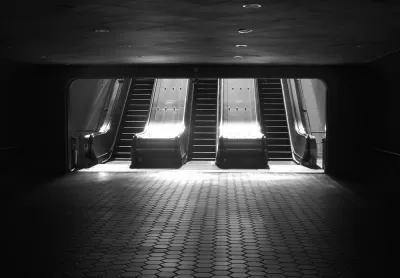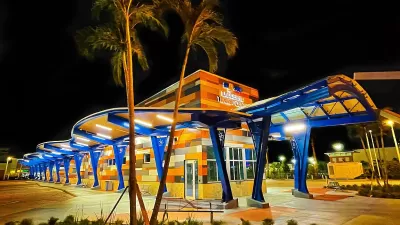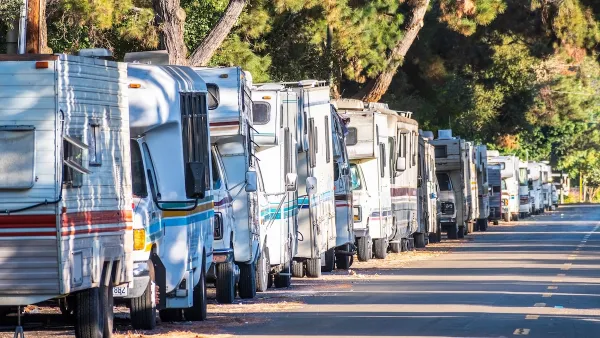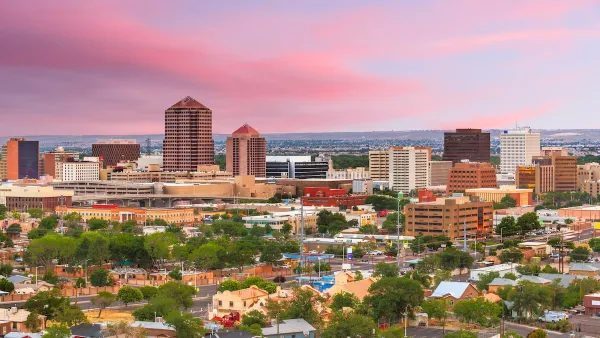As more people experiencing homelessness seek shelter in transit facilities, transit agencies are looking for ways to offer assistance and reduce interactions with law enforcement.

"America’s transit systems — public spaces with long operating hours and enclosed spaces offering more safety than the streets — have long been de facto shelters for the nation’s homeless population," write Michael Gold and Erin Woo. "For much of that time, transit agencies have turned to the police to address complaints by penalizing and ejecting those taking refuge on trains, subways and buses."
As Gold and Woo write, "The urgency for new solutions has deepened during the coronavirus pandemic, which has worsened homelessness and left transit systems struggling to win back riders who fled."
In New York City, "[Mayor] Adams’s plan deploys police officers and mental-health workers underground to remove people who shelter on the subway. He has said the focus is on connecting people to housing, health services and counseling, not on aggressive policing." But "Many advocates are skeptical, arguing that Mr. Adams’s plan relies heavily on police intervention and enforcement of the subway’s code of conduct, which has rules targeting homeless people."
The article outlines efforts by transit agencies in San Francisco, Philadelphia, and Los Angeles to develop outreach programs and minimize interaction between law enforcement and unhoused people. "In 2018, [the Southeastern Pennsylvania Transportation Authority] — which before the pandemic averaged about a million trips per day across buses, subways, trolleys and regional rail — turned over an 11,000-square-foot space in a concourse below the station to Project HOME, a nonprofit that helps homeless people." To assist those sheltering in SEPTA facilities, "The group converted the space to a drop-in center that offers temporary shelter, medical services, access to restrooms and laundry and help finding housing." The agency is considering adding similar facilities to other stations.
The Philadelphia program is not without its challenges. "Workers also still struggle to find acceptable shelter for many who need it. And fewer than 50 percent of those contacted by outreach workers agree to accept services, [SEPTA Police Chief Thomas J. Nestel III] said." Advocates hope cities will invest more in human-centered approaches that prioritize outreach and supportive services.
FULL STORY: What Other Cities Can Teach New York About Homelessness on Transit

Maui's Vacation Rental Debate Turns Ugly
Verbal attacks, misinformation campaigns and fistfights plague a high-stakes debate to convert thousands of vacation rentals into long-term housing.

Planetizen Federal Action Tracker
A weekly monitor of how Trump’s orders and actions are impacting planners and planning in America.

In Urban Planning, AI Prompting Could be the New Design Thinking
Creativity has long been key to great urban design. What if we see AI as our new creative partner?

The Vast Potential of the Right-of-Way
One writer argues that the space between two building faces is the most important element of the built environment.

Florida Seniors Face Rising Homelessness Risk
High housing costs are pushing more seniors, many of them on a fixed income, into homelessness.

Massachusetts Budget Helps Close MBTA Budget Gap
The budget signed by Gov. Maura Healey includes $470 million in MBTA funding for the next fiscal year.
Urban Design for Planners 1: Software Tools
This six-course series explores essential urban design concepts using open source software and equips planners with the tools they need to participate fully in the urban design process.
Planning for Universal Design
Learn the tools for implementing Universal Design in planning regulations.
Gallatin County Department of Planning & Community Development
Heyer Gruel & Associates PA
JM Goldson LLC
City of Camden Redevelopment Agency
City of Astoria
Transportation Research & Education Center (TREC) at Portland State University
Jefferson Parish Government
Camden Redevelopment Agency
City of Claremont





























